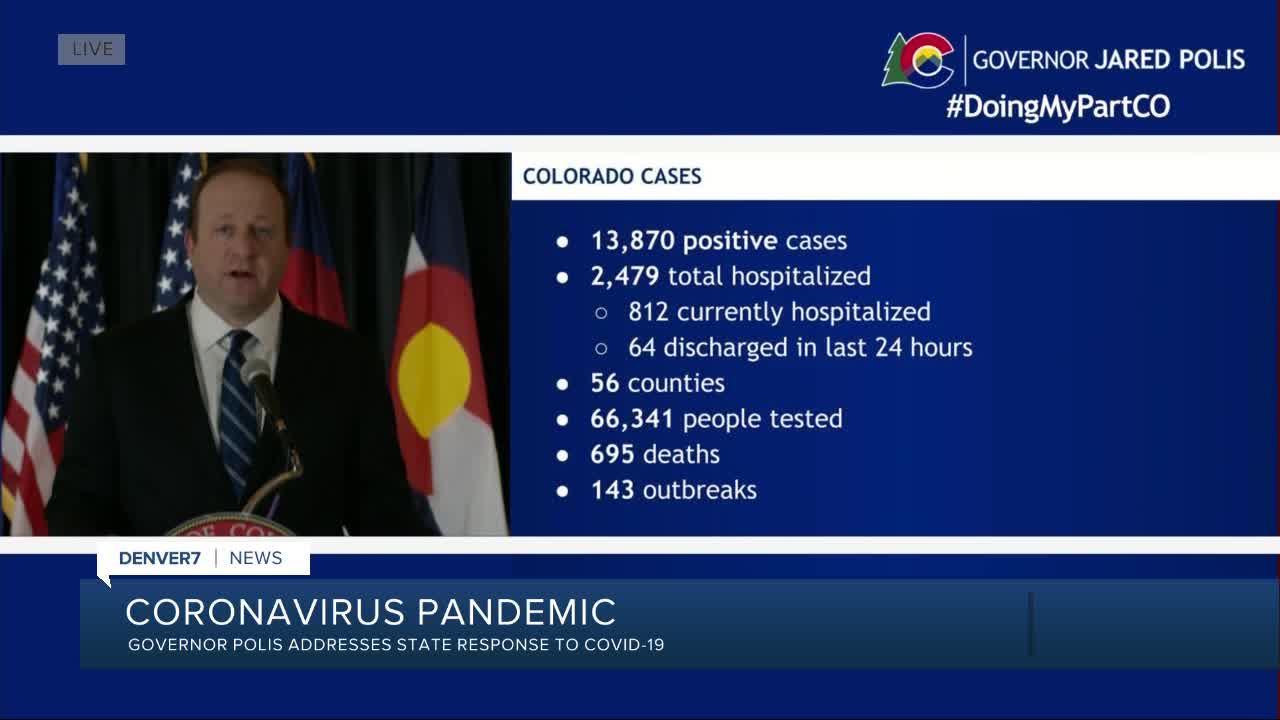DENVER – Colorado. Gov. Jared Polis on Sunday afternoon issued the much-anticipated “safer at home” executive order that outlines what the gradual reopening phase of some businesses in the state will look like in the weeks ahead.
Most of the state will move to the safer at home guidelines starting Monday. But the majority of metro Denver counties – including Denver, Adams, Arapahoe, Jefferson, Boulder, Pitkin and Broomfield – have extended their stay-at-home orders through May8 and will wait to move to the next phase.
San Miguel County says it will continue its current public health order through May 1 and then align with the governor’s “safer at home” order starting May 2.
But for the rest of the state, retail businesses can open for curbside delivery and real estate showings can resume starting Monday under the new order.
For industry-specific guidance on how to safely reopen, click here.
In addition to the executive order on safer at home, Polis also issued an executive order Sunday allowing certain elective medical, dental and veterinary procedures to resume Monday if medical facilities follow a set of distancing guidelines and rules on cleaning, safety and patient prioritization issued Tuesday by the Colorado Department of Public Health and Environment.
The safer at home order advises all people who are 65 or older; have a chronic lung disease, asthma, or a serious heart condition; are immunocompromised; are pregnant or who are deemed to be high risk by their medical providers to continue to stay home except when absolutely necessary.
It also directs anyone who is sick or tests positive for COVID-19 to stay at home unless to seek medical care and advises Coloradans to wear cloth face coverings or masks whenever they are in public.
Gatherings of 10 people or more will remain prohibited in public spaces and private commercial spaces. People are also ordered to limit their social interactions as much as possible and their essential travel within their county or residence and recreational travel no farther than 10 miles from their residence.
“While we have seen indications that our efforts to ‘flatten the curve’ are working, transmission of the virus continues to threaten Coloradans’ way of life and livelihoods,” Polis wrote in the order. “…While this is a first step toward resuming our daily lives, the State is monitoring the spread of COVID-19 and additional precautions may be necessary in the future.”
On Friday, May 1, Colorado retail businesses can phase-in public openings if they are following the order and can keep measures in place to increase physical distancing between customers and between employees and protecting employees while following cleaning and safety protocols.
And on Monday, May 4, businesses will be able to reopen to employees if they can keep staffing levels below 50% at the building at one time and if those best practices that retailers will have to follow can be met as well.
Restaurants will have to continue delivery, window, curbside delivery or walk- or drive-throughs to serve food.
And businesses with more than 50 employees at a location will have to follow protocols the CDPHE released Monday in a new public health order that could include symptom and temperature screenings and other cleaning protocols, according to the order.
The safer at home order also directs the Colorado Department of Labor and Employment to issue temporary rules to extend paid sick leave for up to two-thirds pay for 14 days if a worker tests positive for the coronavirus, has symptoms or has been directed to quarantine or isolate themselves due to COVID-19.
And it directs the CDLE to issue temporary rules and guidance to be sure workers – particularly in the vulnerable population – will not lose their eligibility for unemployment insurance if they refuse to return to work and can demonstrate their working conditions aren’t safe.
As for any counties hoping to reopen businesses early, the order says, as Polis did on Friday, that the CDPHE will not give any county that implements less-restrictive measures than contained in the order any COVID-19 preparedness grant money if it did not receive approval from the department.
In order to do so, a county will have to issue a written application to the CDPHE approved by the local public health authority, all county hospitals (unless there are none) and a majority of county commissioners – or in the case of Denver, the mayor, and in Broomfield, the city council – showing the county has a low COVID-19. Case count or has seen 14 consecutive days of a decline in case numbers.
But the order also makes clear that a county or municipality can also adopt “more protective standards” than those contained in the safer at home order, as the metro-area counties have done. The order says that the measures can take effect once adopted by the county or municipality and do not require state approval.
Polis also ordered the creation of the “New Normal Advisory Board” he discussed order this week, which will advise his office and the CDPHE on the steps that will take place during “safer at home.”
The current safer at home order expires May 27 unless Polis extends it. He has hinted that the phase will last beyond May.
The governor is expected to further discuss the next phase at a news conference Monday.
““Together, Coloradans have been effective in leveling and flattening the curve, but life will remain much more dangerous than usual these next few months and we should all wear masks when in public. Safer at Home is by no means a free-for-all,” Polis said in a statement. “My administration has acted boldly in the face of this pandemic and is focused on ensuring our state can endure on the trail ahead. We all have a personal responsibility to slow the spread of the virus and must find a way of living that is psychologically and economically sustainable for Coloradans.”





